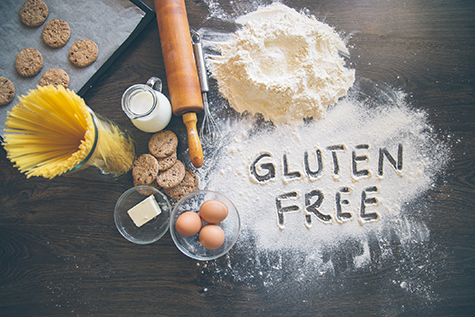The Uncomfortable Truth About Gluten-Free Food

The gluten-free diet has been widely adopted by people that don’t have celiac disease or gluten intolerance. Why?
Well, in many cases there is a good reason to try it out, but there are also many misperceptions that lead people down the wrong path.
Can eating gluten-free really make you lose weight? Are all of the processed gluten-free foods healthy, and, are they healthier because they don’t have gluten? Why are gluten-free items located in the “health food” section of my grocery store?
There’s certainly a lot to discuss, so let’s look at these questions and more.
I can still clearly remember the feeling I got when I was diagnosed with celiac. I remember feeling nervous and worried about the fact that I had strict dietary regulations that would now follow me for the rest of my life.
I also remember thinking about how I would never be able to have my favorite foods again. Not so knowledgeable about the products that were available, I thought I would have to bid farewell to things like pizza and chocolate chip cookies forever.
What’s interesting is that I didn’t really eat junk in my day to day life, but when suddenly faced with the thought of never being able to eat cookies and cake again, those items became more important to me.
But, my first few trips to the grocery store had me in shock. Gluten-free pizza! Gluten-free cookies! Crackers! Pancake mix! Bagels! Chocolate cake! I even found myself getting excited about foods that I had never eaten just because they were gluten-free, and therefore available to what I then viewed as something I couldn’t eat). Cinnamon buns! Croutons! Mozzarella sticks! But should I really be buying this stuff?
The Risks of Going Gluten-Free
A survey of people eating a gluten-free diet found that 65% believed that gluten-free food was healthier, and 27% believed that eating gluten-free would lead to weight loss. Now, don’t get me wrong: if you have celiac or gluten sensitivity, eating gluten-free is not only healthier, but essential. However, it does come with its share of complications. Eating a gluten-free diet, especially one high in processed foods, can lack vitamins, minerals and fiber that our bodies need to thrive.
Not only are gluten-free processed, packaged foods not healthier, they are often worse for you. Gluten, a binding agent, doesn’t magically make foods healthier when it is removed. In fact, often times gluten-free baked goods, breads, crackers and cereals have added sugar and fat to make them more palatable. Sweets like gluten-free pizzas and cookies sometimes have up to two to three times more calories and fat than their counterparts. Also, regular breads and breakfast cereals are often fortified with things like vitamin D and iron, giving them additional health benefits that gluten-free items don’t have. This is especially important for people suffering from celiac, because the damage done to our intestines already makes it that much more difficult for our bodies to absorb the vitamins and nutrients that we need.
Gluten itself doesn’t offer any particular health benefits, but a lot of products that contain gluten do. Going gluten-free means saying no to many common, nutritious foods, such as whole grain breads. Whole grain foods are rich in B vitamins, iron, and fiber. Additionally, studies have found that a healthy diet containing whole grain foods may help lower the risk of heart disease, type 2 diabetes, and some forms of cancer. For those of us who must eat gluten-free, we do have products like quinoa, millet and amaranth, but depending on where you are, these can be difficult to find.
The fact is, completely eliminating gluten from your diet requires the elimination of an entire category of food, and will inevitably lead to nutritional deficiencies. Gluten-free products tend to have a lot less of the important vitamins and nutrients we all need, including calcium, folic acid, zinc, magnesium and the previously mentioned B vitamins and fiber.
Making Smart Choices
Just like any diet, the basics of a gluten-free diet should be whole foods that are naturally gluten-free, like fruits and vegetables, lean meats and fish, and if you can eat them, dairy products and eggs. While eating natural, fresh food that you prepare at home is ideal, our hectic schedules don’t always allow for it, which is why it’s particularly important to make sure you get all of the vitamins and nutrients that can be seriously lacking in a gluten-free diet. A vitamin supplement, especially one specifically catered to gluten-free diets, can really help.
We hope this helped clarify some questions we’ve seen popping up lately about gluten-free diets and gluten-free processed goods. That said, we fully endorse (and practice) grabbing a gluten-free pizza or cookie every once in a while. Taking care of a healthy body and mind involves treating yourself every once in a while!
By Giliah Nagar at Celiact.com
